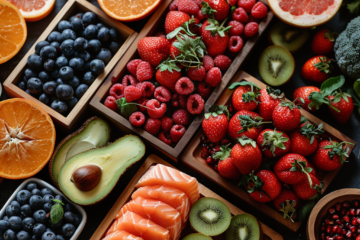Understanding Plant-Based Diets
Hey there, fellow health fans! Welcome to Health Zone, where we’re all about helping you live your best, healthiest life. Today, we’re diving into the leafy world of plant-based diets — the kind that makes kale seem like the new bacon (sort of). Whether you’re trying to lose a little weight, get more energy, or just eat more greens, a plant-based diet could be your new best friend.
What is a Plant-Based Diet?
Let’s clear something up: eating a plant-based diet doesn’t mean you’re only going to be munching on celery from now on. It’s about eating mostly foods that come from plants — like vegetables, fruits, nuts, seeds, oils, whole grains, and beans. It’s like Mother Nature’s buffet, without all the heavy stuff.
Different Types of Plant-Based Diets
So, you’re interested in plant-based eating, but not ready to say goodbye to cheese forever? Don’t worry, there are lots of options!
1. Vegan: This is totally plant-based. No animal products at all. Bring on the quinoa and tofu!
2. Vegetarian: Similar to vegan, but with a bit more flexibility. Vegetarians might still eat eggs, cheese, and milk — anything that comes from animals but doesn’t harm them.
3. Flexitarian: Mostly plants, but it’s okay if a sausage sneaks into your meal sometimes.
4. Pescatarian: Lots of veggies with fish on the side. Think of it like adding a sea breeze to your salad.
Why Choose a Plant-Based Diet?
You might wonder, “Why should I swap my steak for spinach?” Here’s why:
– It supports a heart so happy it could dance.
– Helps manage weight without feeling like you’re carrying a massive turkey.
– Lowers the risk of diseases like diabetes and keeps your digestion on track.
– Helps you live a long, healthy life.
– Boosts your energy levels like you’re running on solar power.
Important Nutrients in a Plant-Based Diet
You might worry about missing out on nutrients. But don’t worry, plants have got you covered!
– Protein Sources:
– Legumes: Beans, peas, and lentils are your power trio.
– Nuts and Seeds: Like almonds, walnuts, and chia seeds.
– Tofu and Tempeh: Soy superstars.
– Quinoa: The all-around super grain.
– Vitamins and Minerals:
– Vitamin B12: Get it from fortified cereals or supplements.
– Iron: Leafy greens and lentils are great.
– Calcium: Try almond milk, fortified orange juice, or kale.
– Omega-3 Fatty Acids: Flaxseeds, chia seeds, and walnuts are awesome.
Creating a Balanced Plant-Based Meal Plan
Worried about missing nutrients? Plan like a pro!
– Plan for Your Nutritional Needs: Make your meals colorful like a box of crayons!
– Importance of Variety in Diet: Mix it up with seeds, beans, and more.
– Tips for Meal Prepping: Become a Tupperware artist.
– Sample Weekly Meal Plan: Start Monday with avocado toast and end Friday with a tofu stir fry!
Common Myths and Misconceptions
Let’s clear up some plant-based myths:
1. Protein Deficiency Concerns: Plants have more protein than you might think.
2. Cost of Plant-Based Diets: Some greens are expensive, but beans are budget-friendly.
3. Taste and Satisfaction: With the right spices, plants can be a flavor explosion!
Top Plant-Based Foods to Include
Turn your plate into a plant paradise with:
– Leafy Greens (Hey, Popeye!)
– Colorful Fruits and Berries (Nature’s candy, no sugar crash.)
– Whole Grains (Quinoa, bulgur, barley, oh my!)
– Beans and Lentils (The legume legends!)
– Nuts and Seeds (Small but mighty munchies.)
– Plant-Based Drinks (Say hello to almond milk lattes.)
Tips for Moving to a Plant-Based Diet
Ready to give it a try? Here’s how:
– Start Slow and Steady: You don’t have to change overnight.
– Try New Recipes: Cooking should be fun!
– Avoid Processed Foods: Watch out for hard-to-pronounce ingredients.
– Find Supportive Communities: There’s a whole world of help out there.
Environmental and Ethical Benefits
Besides personal health, plant-based diets also help:
– Lower Carbon Footprint: Better for our planet!
– Save Water: Plants need less water than animals do.
– Be Kind to Animals: Gentler on Mother Nature’s creatures.
Challenges and How to Beat Them
When you hit a bump, try these tips:
– Eating Out: Check menus ahead of time.
– Handling Criticism: Share your new knowledge with friends.
– Finding Plant-Based Products: Shop local and fresh.
FAQs About Plant-Based Diets
Q: Can you get enough protein on a plant-based diet?
A: Yes! Beans, lentils, tofu, and nuts all have plenty of protein.
Q: How do I handle cravings for meat?
A: Try plant-based versions of your favorites, or have them occasionally as a treat.
Q: Are there plant-based options in restaurants?
A: Definitely! Many places offer plant-based meals — just ask!
So there you have it, a full look at plant-based diets as tasty as they are healthy! Whether you’re curious or ready to dive into this new food adventure, there are tons of choices out there. Join the Health Zone, try out some plants, and remember — the greens are always cooler! 🌱



